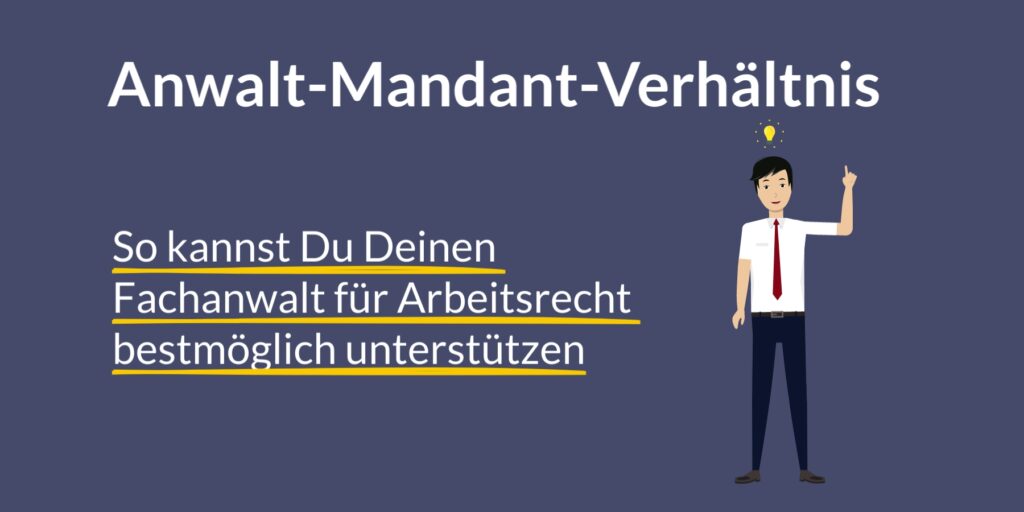A new ruling by the Berlin-Brandenburg State Labor Court raises doubts about whether it's still so "easy" to secure a good severance package after a termination. The ruling could mitigate the so-called risk of employers failing to accept a job. Employees must then make extensive efforts to apply for a job to avoid being accused of "maliciously failing" to earn income elsewhere.
But first things first: In this article I will tell you
- present the decision of the LAG Berlin-Brandenburg,
- explain the judgment in detail (in particular the “delay in acceptance”),
- show what impact this could have on employees’ chances of receiving severance pay,
- show what exactly the court expects from employees in the event of dismissal.
After reading this article, you will know exactly whether a good severance package is still possible after termination. And what you or your Lawyer for your termination According to case law, this may be necessary to keep the risks on the employer’s side high. Employment law attorney in Hamburg and expert for terminations, Warnings and termination agreements, I am available to answer your questions at any time.
Severance payments: Is the era of high amounts over?
Is the age of generous severance pay in labor law in the employment relationship? This is a question that should be of burning interest to many employees who are currently Termination are affected or are about to be laid off. Can employees still legitimately hope to receive generous or at least adequate severance pay in the event of termination? Or is that a thing of the past?
We are taking up this topic because it has a certain Currentness There are new developments that are not necessarily to the advantage of employees. I would like to show you why it may become more difficult to obtain a good severance payment in the future. First and foremost, there is a new Decision of the Berlin-Brandenburg Regional Labor CourtA decision that grants employees certain rights in the event of dismissal or a dismissal dispute. Duties And this could ultimately lead to a significant reduction in the risk for employers of suffering financial disadvantages due to an ineffective termination.
So that's the subject of this article. We want to bring you up to date and show you why the current situation isn't necessarily in the interests of employees. But let's start with the basics.
No entitlement to severance pay, as every child knows – That’s why employers still pay it
Why do employers pay severance pay to employees in the event of termination? Do you know? It's not because they are legally obligated to do so. Right to severance pay In Germany, employees generally have no right to protection in the event of termination. With a few exceptions, mind you. Rather, the dismissal protection process is aimed at regaining the terminated job. It goes without saying, however, that many employees do not want this.
Severance settlements are almost the rule in labor courts
And yet the Severance agreement before the labor court Ganz und Gäbe. Only: It is just a “settlement” – a voluntary benefit from the employerAnd employers relatively often and happily pay a severance payment during the process, because such a dismissal protection process for them financial risks This is because employers cannot always be sure that their dismissal is legally effective. A valid dismissal requires that the employer Formalities observed and also has a Reason for termination at hand. At least if the Dismissal Protection Act is applicable.
The termination process is therefore quite faultyAnd an ineffective one has come back to haunt employers many times in the past. It is therefore entirely understandable that employers, in the event of a dismissal dispute, are looking for a more "elegant" way to bring about a legally secure termination. And a legally secure pathOne way to achieve termination is to conclude a severance agreement. The employer pays severance pay and, in return, receives a contractual assurance in the agreement that the termination has definitively ended the employment relationship.
That is why employers pay severance payments and avoid the decision
But why do employers even get involved and not pursue legal action? As mentioned, the reason is the financial risks. You certainly know that unfair dismissal proceedings can sometimes Months or years If the labor court ultimately determines that the termination is invalid, the employer faces two major problems:
(1) He must continue to employ the employee he wanted to get rid of.
(2) The employer must pay the employee back wages for the past months in which the employee was not employed due to the termination.
The latter point is the actual “Drivers” of the severance paymentThe employer wants to avoid having to pay the employee back several months' salary in the event of an invalid termination. This represents an enormous financial risk that the employer would like to avoid. Legal experts refer to this as "Risk of default in acceptance"How can he eliminate this risk? For example, by concluding a settlement agreement.
This employee obligation reduces the chances of a good severance payment
Now comes the big "but." There is a legal obligation for employees that limits the employer's risk of default. While it has had only limited impact in the past, things could be different today. Therefore, I would like to briefly introduce this obligation to you.
Obligation of employees – crediting earnings towards compensation for late acceptance
Employees are obliged to earnings from other sources on their claims for default of acceptance credit So, if, for example, you take up a new job after the notice period has expired, you must generally have the salary you earned there credited against your compensation claims against your employer.
But that’s not all: You also need to (fictitious) remuneration credited that you have not achieved because you have found possible and reasonable employment maliciously omit If you have a clear job offer from another employer, you do not have to accept the offer. However, if you do not accept it, you will be in breach of your Duty to mitigate damages against your old employer. As a result, the compensation you could have earned had you taken advantage of the employment opportunity will be offset against your default claims.
But as I said, in the past this obligation had little practical effect, because employers did not know whether the employee actually could have started a job. They could therefore not prove that an employee had violated their duty to mitigate damages. And thus, their risk of default remained.
This plays into employers’ hands when it comes to the issue of late acceptance
But today the situation may be different. Three main reasons are responsible for this:
(1) We have almost all industries Full employmentIt is hardly conceivable that workers today would remain unemployed for more than 2-3 months.
(2) According to a decision of the Federal Labor Court, employers have a conditional Right to information with regard to the application efforts of employees during the delay in acceptance.
(3) One Decision of the Berlin-Brandenburg Regional Labor Court imposes extensive obligations on employees regarding the scope and content of application efforts.
And it was precisely this latter decision by the Berlin-Brandenburg Labor Court that recently caused quite a stir. I would therefore like to briefly introduce it to you.
Berlin-Brandenburg Regional Labor Court: Far-reaching obligations of employees
The Berlin-Brandenburg Regional Labor Court (September 30, 2022 – 6 Sa 280/22) had to decide precisely the case scenario I just outlined. The decision was based on the following facts:
Employees with insufficient application efforts over many years
The employment relationship appeared to be broken. The employer had made several Terminations These were all ineffective. In the meantime, the employer did not employ the employee. The employee then filed a lawsuit against the employer. Compensation for late acceptance for the period. He had duly offered his services, but the employer had not accepted them. This was a classic case of default in acceptance.
The employer defended the employee’s claim, claiming that the employee maliciously omit to earn possible and reasonable income elsewhere. The employer thus made the employee Information about what application efforts he has actually made in the meantime.
The employee then Application efforts fully disclosed, which painted a fatal picture for him. During the period in question, he averaged only one application per week sent. Furthermore, the content of the application efforts was also objectionable. They were neither individualized nor was it clear which position the employee had specifically applied for.
The decision of the Berlin-Brandenburg Regional Labor Court
The Regional Labor Court has claim for payment the employee then rejectedThe number of applications fell far short of the requirements. An employee must make application efforts equivalent to Full-time position if he does not want to be accused of maliciously failing to earn other income. The court also criticized the Quality of applications, because it did not see any serious effort behind the employee's applications to find a new job. The application documents were not attractive enough to secure the desired position.
The court also adopted the case law of the Federal Labour Court and confirmed that employees may, at the employer’s request, Information about their application efforts. At least to the extent that the employment agency or job center has presented relevant job offers.
This follows from the decision to pay employees severance pay after termination
I have already said it at the beginning: The risk of default in acceptance is also a Drivers of the severance payment amount in the event of termination. In addition to the prospect of having to continue employing the employee if the termination proves invalid.
The risk distribution may have shifted
However, this automatism has been undermined by the decisions of the Federal Labor Court and the Berlin-Brandenburg State Labor Court. If employers are now able to successfully demand information from employees about their application efforts, Inaction in the process exposed. The employer can thus shed light on his specific risk of default in acceptance.
On the other hand Employees may be under pressure today: The court requires them to seriously apply for a job – and to do so full-time. This is a very far-reaching obligation imposed on employees by the Berlin-Brandenburg Labor Court. Fulfilling this obligation is not easy, especially if employees are hoping for a severance payment and want to tactically keep the financial risks high for their employer.
A step back – are there really lower chances of severance pay?
But let's take a step back: Are the prospects really that much worse than before? Here are two points that might put the significance of the Regional Labor Court's decision into perspective:
First This is a decision by a single court. The labor market situation is undoubtedly good. Employers also have a right to information about application efforts. However, it is not necessarily the case that other courts of appeal apply similarly high standards to application efforts as the Berlin-Brandenburg Higher Labor Court. And one more thing: The right to information is currently legally secured only with regard to the placement suggestions of the Federal Employment Agency.
Secondly The redistribution of risks in the process may not have been fully thought through. Suppose employees apply for placement suggestions from the employment agency. This leads to an interview. The following question is permissible: Would an employer hire an employee who discloses that he (1) is pursuing legal proceedings against his former employer and (2) will start working for this employer again after winning the unfair dismissal case?
It seems impossible that a potential new employer would hire an employee under such circumstances. Or would it? By applying, however, the employee would have legal duty doneAnd the risk of default in acceptance would remain with the employer.
Final tip on the subject of default of acceptance and severance pay
Finally, I would like to give you the following advice: In the case of a dismissal protection process, you should contact your Employment law attorney the concrete Strategy and tactics You should inform him/her in accordance with Your interests Get instructions on how to behave if the legal dispute takes longer.
The blanket claim by employers and employer representatives that their risk is minimized is not entirely justified. You or your lawyer should Make it clear to the other sideYou should make it clear that you legal homework well done and the employer cannot under any circumstances assume that he is not liable to pay compensation for late acceptance.
There are no guaranteeThat the employer would then be willing to pay a higher severance payment because they would be pricing in a higher risk. However, they're likely to get cold feet. And by doing so, you would also demonstrate that you're legally savvy and know exactly how to improve your litigation situation.








